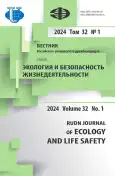Особенности содержания тяжелых металлов в питьевой воде юга Средней Сибири
- Авторы: Побилат А.Е.1, Киричук А.А.1, Баранова О.В.2
-
Учреждения:
- Российский университет дружбы народов
- Оренбургский государственный университет
- Выпуск: Том 32, № 1 (2024)
- Страницы: 51-60
- Раздел: Экологический мониторинг
- URL: https://journal-vniispk.ru/2313-2310/article/view/324095
- DOI: https://doi.org/10.22363/2313-2310-2024-32-1-51-60
- EDN: https://elibrary.ru/GWNSVU
- ID: 324095
Цитировать
Полный текст
Аннотация
Одним из условий нормальной жизнедеятельности живого организма является постоянное поступление чистой и качественной питьевой воды. В ходе исследования было проведено изучение особенностей содержания тяжелых металлов в питьевой воде юга Средней Сибири. В ходе проведения работы были решены следующие задачи: определено содержание тяжелых металлов в питьевой воде; проведено сравнение полученных значений с ПДК тяжелых металлов; выявлены особенности содержания тяжелых металлов в различных районах юга Средней Сибири. При проведении исследования установлено, что вода, используемая для хозяйственно-питьевых нужд населением края, является безопасной для использования, так как не превышены показатели ПДК для тяжелых металлов. Однако можно отметить, что пробы воды, отобранные в селах, обнаруживают более высокое среднее содержание ряда металлов. Наибольшее содержание в питьевой воде характерно для цинка, однако приведенные показатели не превышают ПДК для данного элемента (5 мг/мл). Самое низкое содержание в исследуемых пробах воды характерно для ртути, ПДК для которой составляет 0,0005 мг/мл.
Ключевые слова
Об авторах
Анна Евгеньевна Побилат
Российский университет дружбы народов
Автор, ответственный за переписку.
Email: apobilat@mail.ru
кандидат медицинских наук, старший научный сотрудник кафедры медицинской элементологии, медицинский институт Российская Федерация, 117198, Москва, ул. Миклухо-Маклая, д. 6
Анатолий Александрович Киричук
Российский университет дружбы народов
Email: kirichuk-aa@rudn.ru
ORCID iD: 0000-0001-5125-5116
SPIN-код: 9483-2011
доктор биологических наук, доцент, руководитель департамента экологии человека и биоэлементологии
Российская Федерация, 117198, Москва, ул. Миклухо-Маклая, д. 6Оксана Васильевна Баранова
Оренбургский государственный университет
Email: baranovaov@yandex.ru
ORCID iD: 0000-0002-2780-6499
SPIN-код: 2310-7344
кандидат биологических наук, доцент, заведующий лабораторией нутрициологии, Институт биоэлементологии
Российская Федерация, 460018, Оренбург, просп. Победы, д. 13Список литературы
- Levchuk AA, Alexandrova AV, Sidorkovich SA. Assessment of the quality of groundwater used for economic and drinking purposes. The Eurasian Scientific Journal. 2019;11(4):7. (In Russ.) https://esj.today/PDF/09NZVN419.pdf
- Novikova YA, Friedman KB, Fedorov VN, Tikhonova NA, Kovshov AA, Myasnikov IO. About the question of the assessment of the drinking water quality in centralized water systems in the current conditions. Hygiene and Sanitation. 2020;99(6):563–568. (In Russ.) https://dx.doi.org/10.33029/0016-9900-2020-99-6-563-568
- Gorbachev AL. Some indicators of the chemical composition of drinking water and their impact on the health of the population of Magadan. Mikrojelementy v medicine. 2021;22(2):17–24. http://doi.org/10.19112/2413-6174-2021-22-2-17-24 (In Russ.)
- Nikanov АN, Gudkov АB, Popova ОN, Smolina VS, Chaschin VP. Blood mineral composition in residents of the arctic region with low water mineralization rates in centralized tap water supply systems. Ekologiya cheloveka (Human Ecology). 2021;3:42–47. http://doi.org/10.33396 /1728-0869-2021-3-42-47 (In Russ.)
- Kharina GV, Aleshina LV. Assessment of heavy metals contamination of drinking water in the Sverdlovsk region. Scientific/practical journal «Water Sector of Russia: Problems, Technologies, Management». 2020;1:124–134. http://doi.org/10.35567/1999-4508-2020-1-8 (In Russ.)
- Kiku PF, Kislitsyna LV, Bogdanova VD, Sabirova KM. Hygienic assessment of the quality of drinking water and risks to the health of the population of the Primorsky Territory. Hygiene and Sanitation. 2019; 98 (1): 94–101. (In Russ.) http://dx.doi.org/10.18821/0016-9900-2019-98-1-94-101
- Solovykh GN, Osinkina TV. The results of the study of mercury content in water, sediments and bivalve mollusks of the middle course Ural river and assessments of its toxic effect on lysozyme activity and bacterial seeding of the gills of mollusks. Orenburg Medical Bulletin. 2019;7(1):62–68. (In Russ.)
- Sattarov MR. Toxic substances in fish and seafood. Youth and science. 2020;2:11–11. (In Russ.)
- Spivakovsky YM, Spivakovskaya AY. Microelements and their role in human life (Message 2). Meditsinskaya sestra. 2006;1:39–41. (In Russ.)
- Skalny AV, Skalnaya MG. The role of microelement imbalance in the development of endemic goiter in schoolchildren of oil and gas bearing regions of the Western region of the Republic of Kazakhstan. Mikrojelementy v medicine. 2016;17(2):36–44. http://doi.org/10.19112/2413-6174-2016-17-2-36-44 (In Russ.)
- Daminova LA, Khalikov RA, Khasanova ZM, Khasanova LA. Relevance of identifying and correcting microelementosis among specialists in hazardous professions. Bulletin of the Bashkir State Pedagogical University named after M. Akmully. 2019;1(49):27–41. (In Russ.)
- Vasilovsky AM, Kurkatov SV, Mikhailuts AP, Skudarnov SE. Habitat hygiene in the Krasnoyarsk Territory. Novosibirsk: Nauka publ., 2015. 146 p. (In Russ.)
- On the state of sanitary and epidemiological well-being of the population in the Krasnoyarsk Territory in 2022: State report. Office of the Federal Service for Supervision of Consumer Rights Protection and Human Welfare in the Krasnoyarsk Territory, 2023. (In Russ.)
- Meshkov NA, Bobrovnitskii IP, Yudin SM, Skovronskaya SA, Valtseva EA. Critical issues concerning epidemiological and environmental health assessment of the environment and public health in the Russian Arctic. Russian journal of rehabilitation medicine. 2019;2:40–73. (In Russ)
- Zamyatina MF. Ecological and climatic aspects of the people’s conservation of the regions of Russia. Regional economics and territorial development. 2021;1(15):48–59. http://doi.org/10.52897/978-5-8088-1636-7-2021-15-1-48-59
- Artemenkov AA. The problem of preventing endemic diseases and microelementosis in humans. Profilakticheskaya Meditsina. 2019;22(3):92–100. https://doi.org/10.17116/profmed20192203192 (In Russ.)
Дополнительные файлы









